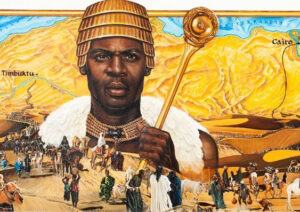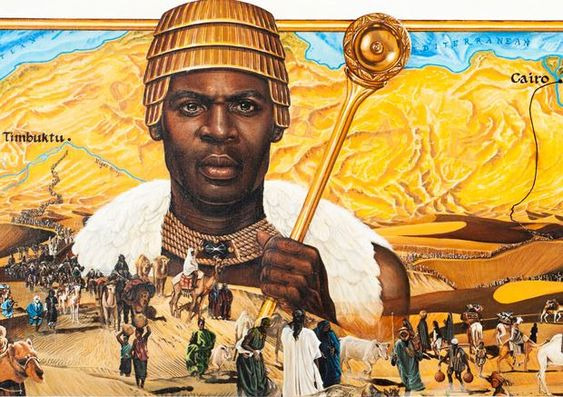| Mansa Musa Net worth | $400 Billion |
|---|---|
| Place of birth | Mali Empire |
| Profession | King |
| Spouse | 4 |
| Children | 2 children |
Mansa Musa Net worth
In the annals of history, there have been countless figures whose wealth has captured the imagination of generations. Yet, amidst the pages of time, one name stands out like a gilded beacon – Mansa Musa. Often heralded as the richest person to have ever lived, his net worth remains shrouded in both legend and historical accounts. In this article, we embark on a journey to uncover the astounding wealth of Mansa Musa, the legendary ruler of the Mali Empire.
Who Was Mansa Musa?
Before delving into the riches of this enigmatic figure, it’s crucial to understand who Mansa Musa was. Born in 1280, he reigned over the Mali Empire in present-day West Africa. His empire was not only known for its vast wealth but also for its cultural and intellectual contributions to the world. Mansa Musa’s family background is rooted in the Keita dynasty, a noble lineage that played a significant role in the Mali Empire’s governance and culture.
The Mali Empire: A Glimpse of Prosperity
Mansa Musa’s wealth was intrinsically tied to the prosperity of the Mali Empire. The empire was a trade hub, primarily due to its strategic location along the trans-Saharan trade routes. This allowed it to amass immense wealth by trading gold, salt, and other valuable commodities.
Mansa Musa’s Ascension to the Throne
Mansa Musa ascended to the throne in 1312, inheriting a kingdom that was already wealthy. However, his leadership and ambitious pursuits catapulted the Mali Empire to unimaginable riches. Mansa Musa, whose birth name was Musa I of Mali, was born around 1280 in Niani, a city in the heart of the Mali Empire. He belonged to the Keita dynasty, a noble lineage contributing to Mali’s governance and culture. Even in his youth, Musa showed signs of leadership and wisdom beyond his years. Mansa Musa’s path to the throne was not one of struggle or conquest; rather, it resulted from his noble lineage. He ascended to power in 1312, following the death of his predecessor, Abu-Bakr II. Upon assuming the title of Mansa (meaning “emperor” or “sultan”), Musa inherited an empire that was already prosperous, thanks to its strategic location and thriving trade.
The Enigma of Mansa Musa’s Net Worth
Determining Mansa Musa’s net worth with precision is a challenging task. The lack of detailed financial records from that era has left us with only estimates and legends to rely on.One of the most famous tales about Mansa Musa Net worth centers around his hajj pilgrimage to Mecca in 1324. During this journey, he distributed vast quantities of gold, causing inflation in the regions he passed through. This extravagant display of wealth left an indelible mark on history.
Contemporary Accounts
Historians like Ibn Battuta, who documented the Mali Empire during Mansa Musa’s rule, provide some insights into his wealth. However, these accounts are often colored by legend and exaggeration.
Mansa Musa’s Impact on History
Mansa Musa was a wealthy ruler and a patron of art, culture, and learning. He established libraries and universities, further enriching the intellectual landscape of his empire.The legacy of Mansa Musa endures to this day. His immense wealth and patronage of Islamic scholarship left an indelible mark on the history of West Africa.
The Mythical Wealth
Mansa Musa’s wealth is often described in almost mythical terms. According to some accounts, his fortune was so immense that it defied imagination. Stories abound of him carrying gold nuggets as large as ostrich eggs and distributing them generously during his pilgrimage to Mecca. This extraordinary display of opulence left a lasting impression on those who witnessed it and contributed to the legend of his unparalleled riches.
The Elusive Net Worth
Despite the tales of his wealth, determining Mansa Musa’s precise net worth remains elusive. Historical records from the 14th century, especially those from the heart of Africa, are scarce and often inconsistent. Moreover, the economic landscape of the time was vastly different from today’s, making it challenging to translate historical wealth into modern terms.

Contemporary Accounts
Some contemporary accounts exist, albeit clouded by the passage of time and the aura of legend surrounding Mansa Musa. The Moroccan explorer Ibn Battuta, who visited the Mali Empire during Mansa Musa’s reign, documented the wealth he encountered. Ibn Battuta marveled at the opulence displayed in Mali’s capital, Timbuktu, and the lavish gifts presented to him during his visit.
The Mali Empire’s Prosperity
To comprehend Mansa Musa’s wealth, one must also grasp the economic landscape of the Mali Empire. The empire’s prosperity relied on abundant natural resources and strategic trade routes. Mali famously possessed an abundance of gold, which constituted a major source of wealth. Traders exchanged this precious metal within Africa and also with distant lands, including Europe and the Middle East.
Cultural Patronage and Legacy
Mansa Musa’s legacy extends beyond his wealth. He was a visionary ruler who valued culture and education. During his reign, the Mali Empire became a learning and artistic expression center. He sponsored the construction of mosques, libraries, and universities, drawing scholars from far and wide. For example, the famous Sankore University in Timbuktu became a renowned hub of Islamic scholarship during his reign.
An Enduring Impact
Mansa Musa’s influence reached far beyond his lifetime. His reign represents a pinnacle in the history of the Mali Empire, and people still celebrate his contributions to culture, religion, and commerce today. Mansa Musa’s leadership played a part in fueling the empire’s wealth and achievements, leaving an enduring legacy in the annals of history. Consequently, scholars and enthusiasts continue to study and celebrate the empire’s prosperity and cultural contributions. Furthermore, they continue to study and celebrate these aspects to this day.
Conclusion
In the annals of history, Mansa Musa Net worth few individuals have left a legacy as awe-inspiring as Mansa Musa. While his exact net worth may forever remain a subject of speculation, there is no doubt that he was one of the wealthiest and most influential figures in history.
FAQs
1. How did Mansa Musa accumulate his wealth?
Mansa Musa’s wealth was primarily amassed through the lucrative trade in gold and salt, along with the strategic positioning of the Mali Empire along trans-Saharan trade routes.
2. What impact did Mansa Musa have on the Mali Empire?
Mansa Musa’s rule saw the Mali Empire reach unprecedented prosperity in terms of wealth and cultural and intellectual achievements.
3. How has Mansa Musa’s legacy endured?
Mansa Musa’s legacy endures through his patronage of art, culture, and learning, as well as his influence on the history of West Africa.
4. Are there any contemporary accounts of Mansa Musa’s wealth?
While there are some contemporary accounts, they are often imbued with legend and exaggeration, making it difficult to ascertain his exact net worth.
5. How did Mansa Musa’s pilgrimage to Mecca impact his wealth?
Mansa Musa’s pilgrimage to Mecca is famous for the extravagant distribution of gold along the way, which led to inflation in the regions he traversed.

Starznetworth is a website that provides information about the net worth of celebrities from various fields, including entertainment, sports, and business. The website offers detailed profiles of each celebrity, including their career highlights, earnings, and personal life.





